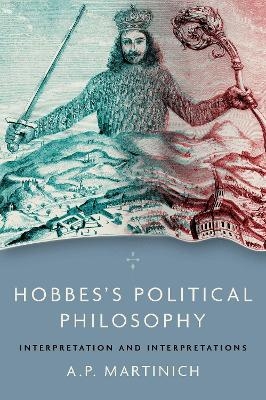
Hobbes's Political Philosophy
Oxford University Press Inc (Verlag)
978-0-19-753171-6 (ISBN)
Hobbes's Political Philosophy: Interpretation and Interpretations aims to clarify Hobbes's positions by examining what Hobbes considered a science of politics, a set of timeless truths grounded in definitions. A.P. Martinich explains this science of politics, examining Hobbes's views on the laws of nature, authorization and representation, sovereignty by acquisition, and others. He argues that in addition to the timeless science, Hobbes had two timebound projects. The first was to eliminate the apparent conflict between the new science of Copernicus and Galileo and traditional Christian doctrine by distinguishing science from religion and understanding Christianity as essentially belief in the literal meaning of the Bible. The second was to show that Christianity is not politically destabilizing by appealing to biblical teachings such as "Servants, obey your masters," and "All authority comes from God."
In examining Hobbes's views on political philosophy, Martinich gives a comprehensive overview of Hobbes's historical context and puts his arguments in dialogue with other interpretations of Hobbes's philosophy, drawing on the work of scholars such as Jeffrey Collins, Edwin Curley, John Deigh, and Quentin Skinner. This new interpretation of Hobbes's work will be of interest to philosophers interested in the history of philosophy as well as those interested in political philosophy, theology, and moral philosophy.
A. P. Martinich received his Ph. D. from the University of California at San Diego in 1973. He specialized in the philosophy of language and the history of political philosophy, especially 17th century English philosophy. He was Vaughan Centennial Professor in Philosophy from 1999 until his retirement in 2020. He was also Professor of History and of Government. He was a member of the Board of Directors of the Journal of the History of Philosophy from 1983 until 2018 and vice-president of the Board from 1996 until 2018. For many years, he has been a member of the advisory board of several journals or professional organizations such as, Comparative Philosophy (2009- ), Hobbes Studies (2013- ) and the European Hobbes Society (2015- ). He is currently emeritus professor of philosophy. His books and articles have been translated into Chinese, Korean, Persian, Portuguese, Slovak, and Turkish. He has lectured internationally for decades, especially in the People's Republic of China.
Introduction
1. Hobbes's Political-Philosophical Project: Science and Subversion
2. Interpretation and Hobbes's Political Philosophy
3. On the Proper Interpretation of Hobbes's Philosophy
4. The Interpretation of Covenants in Leviathan
5. Four Senses of Meaning in the History of Ideas
6. Law and Self-Preservation: On Misinterpreting Hobbes's Philosophy, 1650-1700
7. The Laws of Nature are the Laws of God in Leviathan
8. Leo Strauss's Olympian Interpretation: Right, Self-Preservation and Law in The Political Philosophy of Thomas Hobbes
9. Sovereignty by Acquisition
10. Natural Sovereignty and Omnipotence in Hobbes's Leviathan
11. The Author of Sin and the Demoniacs: Two Calvinist Problems Concerning Hobbes and Some of His Contemporaries
12. Hobbes's Erastianism and Interpretation
13. Sovereign-Making and Biblical Covenants in On the Citizen
Bibliography
Permissions
| Erscheinungsdatum | 14.07.2021 |
|---|---|
| Verlagsort | New York |
| Sprache | englisch |
| Maße | 245 x 166 mm |
| Gewicht | 594 g |
| Themenwelt | Geisteswissenschaften ► Philosophie ► Ethik |
| Geisteswissenschaften ► Philosophie ► Geschichte der Philosophie | |
| Geisteswissenschaften ► Philosophie ► Philosophie des Mittelalters | |
| Geisteswissenschaften ► Religion / Theologie | |
| ISBN-10 | 0-19-753171-7 / 0197531717 |
| ISBN-13 | 978-0-19-753171-6 / 9780197531716 |
| Zustand | Neuware |
| Haben Sie eine Frage zum Produkt? |
aus dem Bereich


